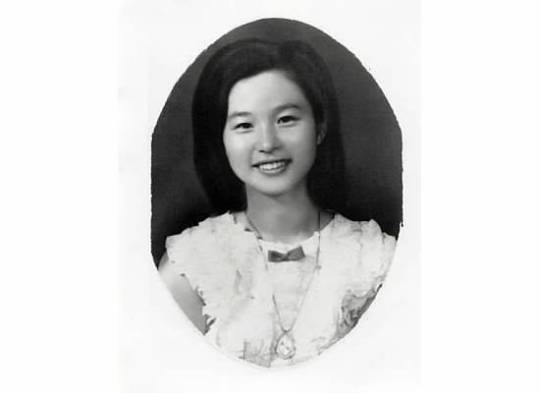By Christine Seung-Eun Chai

The author’s oma: Lee, Sang Shin (c. 1964)
My mother didn’t learn about beauty, femininity, Korean 10-step skincare regimens, or even womanhood from her mother. Instead, she gleaned snippets of beauty advice from her father. Haraboji (grandfather) believed that make-up deterred from real beauty and that the best enhancement to a fresh face was to accessorize with “a single, pure white flower” (insert eye roll).
My oma (mother) met my apa (father) through mutual church friends. Against her family’s wishes they were engaged and moved to California. After following apa to San Francisco, her life was no longer privileged and pampered, despite the fact that she migrated from a post-war third world country to the dream that was the U.S. Through the years, she retained her beauty but also aged more quickly from the rigors of new immigrant struggle: hard work, long days, a stressful marriage, and raising two “American” kids. In the mid-1960s San Francisco, as a young Asian woman with no English skills or work experience, she labored through several different jobs in factories, as a coat check girl, a dishwasher, a manicurist, and eventually owned her own small businesses. My mother, who came from wealth, was now serving rich, white San Franciscans and was even, and offensively, proposed marriage twice: once by an elderly white man who knew she was married and second, by a couple looking to find a caretaker for their mentally disabled son.
After four miscarriages, I was born on Father’s Day. I was a Chai (pronounced more like ‘chwe’) inheriting all the unfortunate Chai features, and thus was considered an unattractive baby. However, having survived a fragile pregnancy, my parents[ts1] were grateful for a healthy daughter. My only redeeming physical attribute was my fair skin. Because of my sleepy monolids and turned up nose, I was quickly nicknamed ‘piggy eyes’ and ‘pug nose’ – (ahhhh…Koreans and their nicknames).
In other words, I was not a pretty girl.
In contrast, I have very clear memories of my mother’s stories of her beauty. As a child, her narrative and words were fact and for many years, I believed there was no woman who compared to her looks. I remember challenging a girlfriend of mine, honestly thinking my mother was more beautiful than hers, simply because it was an actuality.
Though she was and still is everything to me, our temperaments clashed. I never doubted my mother’s love, and to her credit, her devotion made up for insecurities I might’ve adopted from being the ‘ugly duckling’ of the family. Regardless, it was my conflict with Korean standards and their complicated internalization of white supremacy and my more Americanized social upbringing that affected my perceptions of beauty.
As the typical Korean mom, she never hesitated to inform me of when I looked fat, that my legs were too short and my feet too wide, that I had acquired the Chai family monolids, that I ended up being flat-chested, that my nose was turned up… whew! What else? In any case, I later came to understand that my mother was neither boastful nor necessarily critical – that Koreans described physical features as a matter of fact. In my twenties, one of my MALE cousins had the nerve to mention that I was regarded as a ‘dragon’ – akin to the ugly duckling story in Korean folklore – unattractive at birth, then developing into one’s true beauty. Um…back-handed compliment???
Ironically, though Koreans are by and large proponents of plastic surgery; my mother and most in our family are not. I was reminded of my physical deficiencies, but I wasn’t allowed to alter them, if given the opportunity. Again, my naturally beautiful oma, who never needed enhancement and whose beauty routine consisted of soap, water, moisturizer, foundation, rouge and lipstick, was vehemently opposed to cosmetic surgery or experimenting with make-up and skincare regimens, regarding them as frivolous and superficial.
On the other hand, she valued femininity (a value my haraboji impressed upon her) and equated a made-up face with vulgarity. So for me, altering my face with colors and lines and false add-ons became tools of rebellion and symbols of a desperate desire to be ‘pretty’. Eventually I learned to make peace with the way I looked, but became confused when (mostly) white men began noticing me – feeling flattered and more comfortable with my physical self, and then having that newfound confidence crushed with the realization that men were really attracted to “Suzie Wong” or “Lucy Liu” and not Christine Chai.
For a while, as I became more and more politicized around race and feminism, I defied, refused, adapted and tried to live by my own standards. I learned to filter my mother’s observations of me and at the same time, her maternal attentions seemed to relax with age. But, seven years ago, while pregnant with my son, my oma casually commented that she hoped this baby would inherit his mixed-race father’s eyes and though I sarcastically reacted with laughter, my heart sank.
Because I grew up believing I was unattractive by western standards, and possibly, even more so by Korean ones, my protective motherly instincts were alerted and I worried about how I would shield my child from offensive expectations and judgments that he would inevitably internalize. I reminded oma how amazing her grandbaby already was. She nodded and agreed.
When my son was born, he indeed had large double-lidded eyes with his father’s long and curled eyelashes. And as his facial features developed, he went from looking like his father to looking like none other than my mother! Her grandson is validation of her genetic contributions and her legacy. It’s as if she birthed him through me! But, recently, people have been likening Roshan’s appearance to mine. “Really?” I question. I take it as a huge compliment. And recently, I’ve been noticing that I, in my late forties, and my mother, in her late seventies, are looking more and more alike.
I find this greatly satisfying.
About the Author: Christine Seung-Eun Chai teaches ESL, English and Asian American Studies at De Anza College. She is a proud Bay Area native and strives to be a stronger social justice warrior. She’s privileged to live with fellow warrior, Tony, their son, Roshan, pup, Nari along with her ultimate champions: oma and apa.

0 Comments Leave a comment